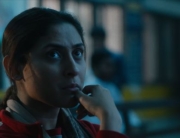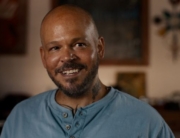
The place is Lagos, and though we see glimpses of privilege, our focus is largely elsewhere, on crowded streets; in small, often unsafe apartment complexes; or in an electrical room with an insoluble web of wires.
The two principal characters are only distantly connected, and their stories are told separately in intersecting vignettes. They are, however, united in an objective: both are attempting to move overseas. They do this, presumably, for job opportunities, though this is never specified.
In one, Mofe (Jude Akuwudike), an electrician who lives with his sister and her children, is trying to move to Spain. When he suffers an unexpected familial loss, it leaves him with the unexpectedly complex and fraught problems of handling funeral expenses and the complications surrounding his sister’s remaining money. His struggles are as labyrinthine and frustrating as the knot of electric wires he frequently confronts in his work. Everywhere he goes, there is someone who needs something from him. There seems to be nowhere to move but in a circle and then downwards.
In the other story line, Rosa (Temi Ami-Williams) and her younger sister, Grace (Cynthia Ebije), who is pregnant, intend to leave for Italy. In spite of Rosa’s working two jobs, they are perpetually behind on rent, and consequently are at the hands of a variety of manipulative people (an unsavory businesswoman, a predatory landlord) to keep themselves afloat and gradually get their visas.
As is probably clear from the above, Eyimofe (This Is My Desire) is not heavy on plot. Instead, in the manner of Altman, the emphasis is on the seething richness of the setting and the endurance with which the characters move through their myriad disappointments and negotiate the mazes that bar them from their goals. There is scarcely a shot that contains only one object of interest. A principal character might be in the foreground while others are fully engaged in their own journeys, moving in the corners. Watching this film feels like looking at one of those giant canvas paintings where, the closer you look, the more stories you can see. The soundscape is equally vibrant, the majority of indoor scenes containing the sounds of the room and those from afar. Additionally, the acting is naturalistic and convincing. The maddening complexity, in which there seems to be a catch to every relationship and every step one must take leads to still more steps, is conveyed with clarity.
Still, I am not convinced this film completely works. Mofe’s and Rosa’s stories lack some urgency in their telling, perhaps because their hopes are not emphasized quite as much as their stoicism. We are also able to see where they are headed, more or less, too quickly. While the way the filmmakers portray lives governed by compromises is compelling, the abusers of power (the businesswoman, the landlord, Mofe’s boss) are a little too simply that and not much more. In a film that aspires to naturalism, this comes across as somewhat contrived.
I would though recommend it for its compassion and the visual and aural sophistication with which it brings Lagos to life. Arie and Chuko Esiri, the two brothers who directed it, are talents worth paying attention to.






Leave A Comment